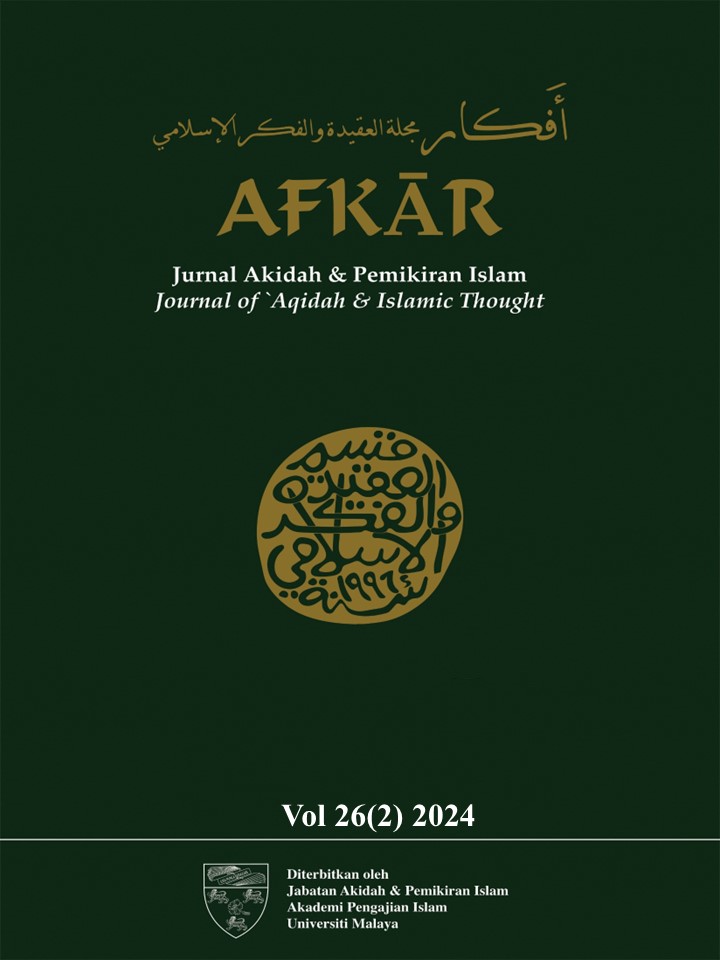Origin of Tasawwuf (Sufism) and Critiquing The Thesis of Transition from Zuhd
Main Article Content
Abstract
The origins of tasawwuf have long been a subject of debate in scholarly circles, with prevailing views suggesting that it emerged as a later development influenced by the concept of zuhd. This article challenges this commonly held view, arguing that such assertions are rooted in a superficial reading of Islamic sources and the earlier literature on tasawwuf. By probing deeper into the original sources and the accounts of classical Sufi masters, this article seeks to demonstrate that tasawwuf cannot simply be regarded as a transitional stage from zuhd, influenced by various internal and/or external factors. Instead, it is an integral part of the religion of Islam, embodied in the notion of ihsan, which is the spiritual ideal of Islamic faith and practice. In its discussion, the article will briefly touch upon what the author believes to be the factors that have led to the misreading and misrepresentation of the history of tasawwuf in both Western and many Muslim writings. Departures from unchecked preconceived notions, and the use of Western concepts and categorizations—belonging to a different cultural context—in studying tasawwuf are identified as some of these factors. By relying on original sources and employing a historical-critical method, this paper aims to clarify that tasawwuf is, in essence, the art of realizing ihsan in theory and practice. As such, it originated with Islam, though its nomenclature and organizational structures may have developed later.
Downloads
Article Details

This work is licensed under a Creative Commons Attribution-NonCommercial 4.0 International License.
References
Ali, Abdullah Yusuf. The Holy Qur’an: Translation and Commentary. Al-Madinah al-Munawwarah: King Fahd Holy Quran Printing Complex, 1405.
Awn, Peter J. “Sufism.” In The Encyclopedia of Religion, vol. 14, ed. Mircea Eliade. New York: Macmillan Publishing Company, 1987, 104-123.
Al-Basri, al-Hasan. Al-Zuhd, ed. Muḥammad ʻAbd al-Rahim Muhammad. Cairo: Dar al-Ḥadith, 1991.
Al-Bukhari, Muhammad bin Ismaʻil. Al-Jamiʻ al-Sahih, ed. Mustafa Dib al-Bagha. Damascus: Dar Ibn Kathir, 1993.
Burckhardt, Titus. Introduction to Sufi Doctrine. Bloomington: World Wisdom, 2008.
Al-Ghazali, Abu Hamid, Muhammad bin Muhammad. Ihya’ ʻUlum al-Din, ed. ʻAli Muhammad Mustafa & Saʻid al-Mahasini. Damascus: Dar al-Fayha’/Dar al-Manhal, 1431/2010.
Al-Haythami, Ibn Hajar. Majmaʻ al-Zawa’id wa Manbaʻ al-Fawa’id, ed. Husam al-Din al-Qudsi. Cairo: Maktabat al-Qudsi, 1994.
Ibn Hanbal, Ahmad. Al-Zuhd, ed. Muhammad ʻAbd al-Salam Shahin. Beirut: Dar al-Kutub al-ʻIlmiyyah, 1999.
Al-Jarrah, al-Wakiʻ bin. Kitab al-Zuhd, ed. ʻAbd al-Rahman al-Faryawa’i. Madinah: Maktabat al-Dar, 1984.
Al-Kalabadhi, Abu Bakr. Kitab al-Taʻarruf li Madhhab Ahl al-Tasawwuf, trans. Arthur John Arberry. Cambridge: Cambridge University Press, 1935.
Massignon, Louis. The Passion of al-Hallaj, trans. Herbert Mason. Princeton: Princeton University Press, 1982.
Mawdudi, Abu al-Aʻla. Toward Understanding the Qur’an: Abridged Version of Tafhim al-Qur’an, trans. & ed. Zafar Ishaq Ansari. Leicester: The Islamic Foundation, 2007.
Melchert, Christopher. “Origins and Early Sufism.” In The Cambridge Companion to Sufism, ed. Lloyd Ridgeon. New York: Cambridge University Press, 2015, 3-23.
Melchert, Christopher. “The Transition from Asceticism to Mysticism at the Middle of the Ninth Century C.E.” Studia Islamica 83(1) (1996): 51-70.
Al-Mubarak, ʻAbd Allah bin. al-Zuhd wa al-Raqa’iq, ed. Ahmad Farid. Riyadh: Dar al-Miʻraj al-Dawliyyah li al-Nashr, 1995.
Murata, Sachiko & William C. Chittick. The Vision of Islam. London-New York: I.B. Tauris, 2000.
Mustafa, Muhammad A. Al-Maqamat wa al-Ahwal. Cairo: Dar al-Tiba’ah al-Muhammadiyyah, 1408/1988.
Mustafa, Muhammad. ʻIlm al-Tasawwuf. Cairo: Dar al-Tibaʻah al-Muhammadiyyah, 1403/1983.
Nasr, Seyyed Hossein, et al. The Study Qur’an: A New Translation and Commentary. New York: HarperOne, 2017.
Nasr, Seyyed Hossein. “The Heart of the Faithful is the Throne of the All-Merciful.” In Paths to the Heart: Sufism and the Christian East, ed. James S. Cutsinger. Bloomington, IN: World Wisdom Inc., 2004, 32-45.
Nasr, Seyyed Hossein. Encyclopedia of Islamic Spirituality. London: Routledge & Kegan Paul, 1987.
Nicholson, Reynold. Studies in Islamic Mysticism. Cambridge: Cambridge University Press, 1921.
Picken, Gavin. “Al-Harith al-Muhasibi and Spiritual Purification between Asceticism and Mysticism.” In Routledge Handbook of Sufism, ed. Lloyd Ridgeon. London & New York: Routledge, 2021, 17-31.
Al-Qushayri, Abu al-Qasim. Al-Risalah al-Qushayriyyah fi ʻIlm al-Tasawwuf, trans. Alexander D. Knysh. UK: Garnet Publishing, 2007.
Ridgeon, Lloyd ed.. Sufism: Critical Concepts in Islamic Studies. London: Routledge, 2008.
Ridgeon, Lloyd. “The Origins of Sufism.” In Routledge Handbook on Sufism, ed. Lloyd Ridgeon. London and New York: Routledge, 2021, 3-16.
Al-Sahlaji al-Bistami, Abu al-Fadl Muhammad bin ʻAli. “Al-Nur min Kalimat Abi Tayfur.” In Shatahat al-Sufiyyah, ed. ʻAbd al-Rahman Badawi. Kuwait: Wakalat al-Matbuʻat, 1978.
Al-Sarraj al-Tusi, Abu Nasr. Al-Lumaʻ fi al-Tasawwuf, ed. Reynold Nicholson, with Arberry’s addition and completion, trans. ʻAdnan Hasan. London: Al Warrak Publishing Ltd., 2018.
Saviri, Sara. “Sufism: Reconsidering Terms, Definitions and Processes in the Formative Period of Islamic Mysticism.” In Les maîtres soufis et leurs disciples des IIIe-Ve siècles de l'hégire (IXe-XIe): Enseignement, Formation et Transmission, ed. Geneviève Gobillot and Jean-Jacques Thibon. Damas; Beyrouth: Presses de l’Ifpo, 2012.
Sedgwick, Mark. Sufism: The Essentials. Cairo: American University Press, 2003.
Smith, W. C.. “Comparative Religion: Whither and Why?” In The History of Religions: Essays in Methodology, ed. Mircea Eliade & Joseph M. Kitagawa. Chicago: The University of Chicago Press, 1959.
Al-Suhrawardi, Abu Hafs ʻUmar Shihab al-Din. ʻAwarif al-Maʻarif, ed. Samir Shams. Beirut: Dar Sadir, 1431/2010.

